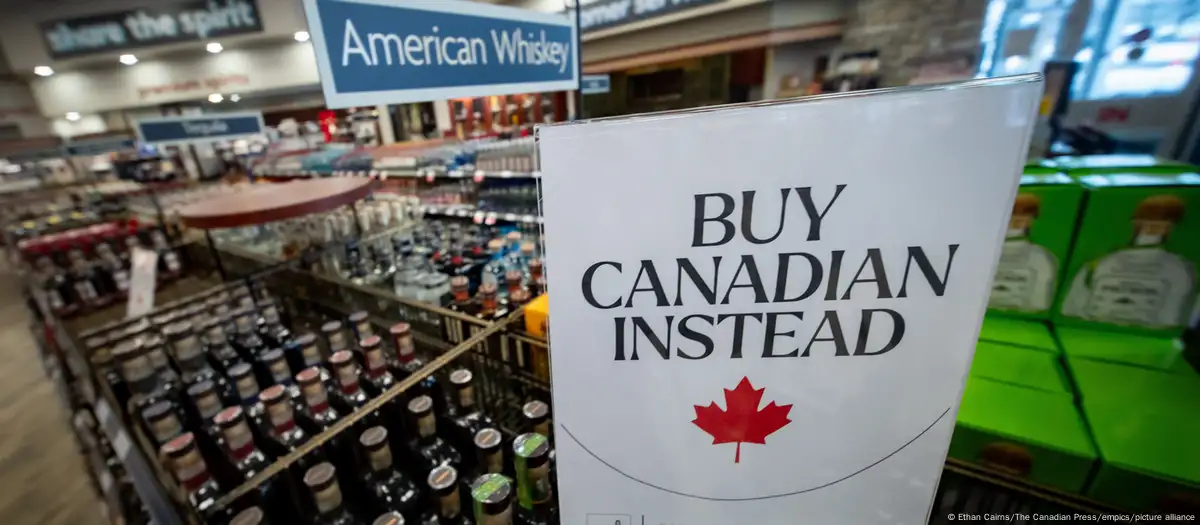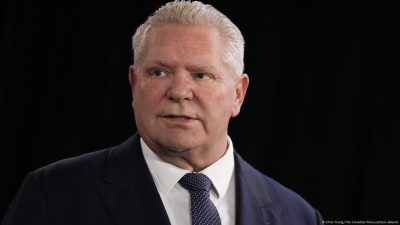
Trump rates have generated reactions in Europe and Canada. Actions include boycott and initiatives to negatively highlight American products on supermarket shelves and dissuade purchase.
Although Donald Trump’s “Liberation Day” packet has been momentarily suspended and somewhat softened, international consumers have kept the boycott of United States products. Traditional business partners are among the hardest hit and from Canada to Europe, they are increasingly adept at “local buy” initiatives, both organized on social networks and in physical stores.
On April 2, Trump imposed a general surcharge on all imports for the US and alleged “reciprocal tariffs” against certain nations – although on April 9, he has slowed the tone, announcing a 90 -day fare break and lowering most of the 10%basic rate sanctions.
The only exception to this milder scheme is China, which now faces 125%rates, because, according to the US representative, would have shown “lack of respect” with “the markets of the world.”
While the governments of some affected countries decree their own commercial barriers, citizens react with their own campaigns. In the European Union – punished with a 20% surcharge over their exports, before the retreat of April 9 – consumers are trying to put upside down – in part literally – the US position in the market.
Norwegian Haltbakk Bunkers will stop providing fuel for US marine ships | Nicolas Maeterlinck/Belga/Picture Alliance
Virtual and business mobilization
Since the White House threatened with tariff measures, several groups have been created on Facebook to organize boycott and campaigns. The Frenchman “Boycott uses: Achetez Français et Europe!” (Buy French and European!) It’s over 30,000 participants. And the Swedes “Bojkotta Varor FRån USA” and “Boykot Varer Fra USA” (boycott of US products), together, already count more than 180,000 members, united to press for the end of sanctions.
In Germany, there seems to be support for a similar posture. The Cuey research group concluded that 64% of the population would rather avoid American articles if possible. A small majority stated that their consumer decisions are already being affected by trumpland policies.
In turn, an online movement on social networks and forums such as Reddit has called for European and Canadian consumers to place US products on the supermarket shelves, as a visual signal to dissuade any buyers.
European companies are also articulating against US firms: Denmark’s largest retailer Salling Group has promised to mark Europe’s products with a black star to help consumers identify them.
At Linkedin, the company’s executive director Anders Hagh said he will continue to sell American products, but the new label is “an extra service for customers who want to buy European brands.”
Other companies are taking even more concrete measures: Norwegian oil and fuel supplier Haltbakk Bunkers has announced that it will stop supplying US Navy vessels.
Tesla sales plummers
The American brand most exposed to the wrath of global consumers is Elon Musk’s Tesla-the largest donor of the Trumpist Electoral Campaign and current Special White House consultant to cut the state bureaucracy through the task force of the Government Efficiency Department (Doge).
The company has lost 40% of its stock market price, and has been the target of public protests – sometimes violent – worldwide. Its global sales fell 13% in the first quarter of 2025, despite discounts and financing offers at dealerships. The drop was more pronounced in Europe, where sales of January 2025 were 45% lower than the previous year, according to the European automotive builders association.
Those who won are local manufacturers: in the first quarter of 2025, Volkswagen was the electric car sales champion, ahead of BMW and three VW conglomerate subsidiaries, Skoda, Audi and Seat. Tesla, before at the top of the sector, was only eighth.
 Ontario Governor Doug Ford has openly criticized American tariff policy | Chris Young/The Canadian Press/Picture Alliance
Ontario Governor Doug Ford has openly criticized American tariff policy | Chris Young/The Canadian Press/Picture Alliance
Anti-Trump climate in Canada favors liberals
In March, Trump imposed a 25% surcharge on Canadian steel, aluminum and cars, as well as the goods not included in the US-México-Canada (USMCA) free ranking agreement.
The growing anti-Trump climate was worth a dramatic increase in popularity to the Liberal Party, previously led by former Prime Minister Justin Trudeau and currently by his successor, Mark Meatary, to the point that the caption present a tight front in the elections of April 24.
Popular rejection in Canada against American products is also strong. In March, Ontario Governor Doug Ford ended a 100 million Canadian contract of $ 412 million with Elon Musk’s Starlink telecommunications company. And commented on the multibillionaire’s X platform: “Ontario doesn’t do business with those who are crazy to destroy our economy.”
Several firms launched “Buy Canadian” campaigns. Ontario’s alcoholic beverages said it would stop stocking Bourbon whiskey and US wines, among other drinks. Provinces like British Columbia and New Brunswick adopted similar measures.
Several websites and apps, such as Buy Beaver and Maple Scan, have also been created to help consumers identify and avoid American articles. Commenting on the recent success of his site Made in Ca, founder Dylan Lobo commented to Business Insider magazine: “There is a lot of patriotism at the moment in this country. There is a strong feeling that the Canadians want to support other Canadians.”
Another case of “Freedom Fries”?
In addition to Europe and Canada, several economic leaders are aware of potential retaliation against US products and how they can affect their business. Among them, heads of companies that acquired American brands.
A few weeks after Trump resumes the White House, Takeshi Niinami, executive director of the Japanese Giant Drink Holdings – owner of brands such as Bourbon Jim Beam whiskey – anticipated that the country’s products would be boycotted by international consumers.
“We have prepared the strategic and budget plan for 2025 from the principle that American products, including whiskey, will be less accepted abroad, because of the first place of tariffs, and second, of emotion,” he commented to Financial Times.
History teacher Garritt Van Dyk realizes in this repudiation of US US goods of a infamous 2003 campaign, when the opposition of France to the invasion of Iraq resulted in that the chips were renamed French Fries to Freedom Fries ”(Freedom).
“At other times in the past there was this weird reaction of ‘we no longer want to belong to this culture,” says the professor at the University of Waikato, New Zealand. In his opinion, the feeling of damage to reputation for American firms and manufacturers may end up being relevant, as “in an overcrowded market, people can make their own choices.”
Originally published by DW on 10/04/2025
The Sullivan Arthur in Matthew Ward Agius
Source: https://www.ocafezinho.com/2025/04/10/tarifaco-de-trump-provoca-boicote-a-produtos-dos-eua/

